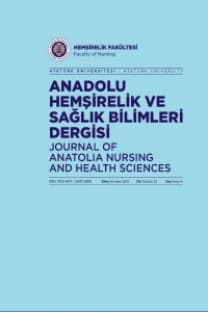Konuşamamak: Parsiyel Larenjektomi olan Hastaların Deneyimlerine İlişkin Kalitatif Bir Çalışma
INABILITY TO SPEAK: A QUALITATIVE STUDY ON THE EXPERIENCES OF PATIENTS WHO UNDERWENT PARTIAL LARYNGECTOMY
___
- Abendstein H, Nordgren M, Boysen, M, Jannert, M, Silander, E, Ahlner-Elmqvist M, et al. Quality of life and head and neck cancer: A 5 year prospective study. Laryngoscope 2005;115(12):2183-92.
- Alasad J, Ahmad M. Communication with critically ill patients. Journal of Advanced Nursing 2005; 50(4): 356-62.
- Braun V, Clarke V. Using thematic analysis in psychology. Qualitative Research in Psychology 2006; 3(2): 77-101.
- Dickerson S, Stone V, Panchura C, Usiak D J. The meaning of communication: Experiences with augmentative communication devices. Rehabilitation Nursing 2002;27(6): 215- 20.
- Dropkin M J. Anxiety, coping strategies, and coping behaviors in patients undergoing head and neck cancer surgery. Cancer Nursing 2001;24(2): 143-8.
- Epstein R M, Franks P, Fiscella K, Shields C G, Meldrum S C, Kravitz R l, et al. Measuring patientcentered communication in patient-physician consultations: theoretical and practical issues. Soc Sci Med 2005; 61(7):1516-28.
- Evitts P M, Kasapoglu F, Demirci U, Miller JS. Communication adjustment of patients with a laryngectomy in Turkey: analysis by type of surgery and mode of speech. Psychology, Health & Medicine 2011;16(6): 650-660.
- Fletcher B S, Cohen M Z, Schumacher K, Lydiatt W. Blessing and a curse head and neck cancer survivors' experiences. Cancer Nursing 2012;35(2): 126- 32.
- Happ M B, Interpretation of nonvocal behaviors and the meaning of voicelessness in critical care. Soc Sci Med. 2000;50(9):1247-55.
- Happ M B, Roesch T, Kagan S H. Communication needs, methods, and perceived voice quality following head and neck surgery. Cancer Nursing 2004;27(1):1- 9.
- Hebel F, Mantsopoulos K, Bohr C. Assessing quality of life in patients after partial laryngectomy. Hippokratia 2014;18(2):156-61.
- Higginbottom G M. Sampling issues in gualitative research. Nurse Researcher. 2004;12(1):7-19.
- Howren M B, Christensen A J, Karnell L H, Funk G F. Health-related quality of life in head and neck cancer survivors: impact of pretreatment depressive symptoms. Health Psychol 2010;29(1):65-71.
- Katz M R, Irish J C, Devins G M, Rodin G M, Gullane P J. Psychosocial adjustment in head and neck cancer: the impact of disfigurement, gender and social support. Head and Neck 2003;25(2):103-12.
- Lorah E R, Tincani M, Dodge J, Gilroy S, Hickey A, Hantula D. Evaluating Picture Exchange and the iPad(TM) as a Speech Generating Device to Teach Communication to Young Children with Autism. J Dev Phys Disabil 2013;25(6):637-49.
- Otuzoglu M, Karahan A. Determining the effectiveness of illustrated communication material for communication with intubated patients at an intensive care unit. International Journal of Nursing Practice 2014;20(5): 490-8.
- Ozlugedik S, Unal A. Epidemiology and risk factors in head and neck cancers. Contemporary Approaches in Ear, Nose, Throat, Head and Neck Surgeries 2005;1(3): 51-6.
- Ozudogru E, Kaya E. Larynx cancer. Galenos Monthly Medicine Journal. 2006;111(9): 38-44.
- Patak L, Gawlinski A, Fung NI, Doering L, Berg J, Henneman E A. Communication boards in critical care: Patients' views. Applied Nursing Research 2006;19(4): 182-90.
- Philippe Y, Espitalier F, Durand N, Ferron C, Bardet E, Malard O. Partial laryngectomy as salvage surgery after radiotherapy: oncological and functional outcomes and impact on quality of life. A retrospective study of 20 cases. Eur Ann Otorhinolaryngol Head Neck Dis 2014;131(1):15-9.
- Rodriguez C S, Rowe M, Koeppel B, Thomas L, Troche M S, Paguio G. Development of a communication intervention to asist hospitalized suddenly speechless patients. Technology and Health Care 2012;20(6): 489-500.
- Sammut L, Ward M, Patel N. Physical activity and quality of life in head and neck cancer survivors: A literature review. Int J Sports Med 2014;35(9):794-9.
- Semple C J, Dunwoody L, Kernohan W G, McCaughan E. Developmental and evaluation of a problem-focused psychosocial intervention of patients with head and neck cancer. Support Care Cancer 2009;17(4):379-88.
- Semple C J, Sullivan K, Dunwoody l, Kernohan W G. Psychosocial interventions for patients with head and neck cancer. Cancer Nursing 2004;27(6):434-41.
- Singer S, Merbach M, Dietz A, Schwarz R. Psychosocial determinants of successful voice rehabilitation after laryngectomy. J Chin Med Assoc 2007;70(10):407- 23.
- Stein-Parbury J, McKinley S S. Patients' experiences of being in an intensive care unit: A select literature review. American Journal of Critical Care 2000;9(1):20- 7.
- Tas A, Yagız R, Karasalihoglu A R, Koten M, Adalı M K, Uzun C. Larenks kanserli hastaların cerrahi tedavi sonrası yaşam kalitesinin değerlendirilmesi. K.B.B. İhtisas Dergisi 2004;12(3- 4):84-90.
- Uyer G. Nurse and patient communication and the significance of communication for the patients. Journal of Medicine Ethics, Law and History at the Turkish Clinics 2000;8(2):90- 4.
- Webster K T, Samlan R A, Jones B, Bunton K, Tufano R P. Supracricoid Partial Laryngectomy: Swallowing, voice, and speech outcomes. Annals of Otology, Rhinology & Laryngology 2010;119(1):10- 6.
- Yıldırım A, Simsek H. Sosyal Bilimlerde Nitel Araştırma Yöntemleri. 9. Basım. Ankara: Seçkin Yayınevi; 2013, p. 129-44.
- Zeine L, Larson M. Pre-and post-operative counseling for laryngectomees and their spouses: An Update. Journal of Communication Disorders 1999; 32(1):51-61
- ISSN: 1309-5471
- Yayın Aralığı: 4
- Yayıncı: Atatürk Üniversitesi Hemşirelik Fakültesi
Konuşamamak: Parsiyel Larenjektomi olan Hastaların Deneyimlerine İlişkin Kalitatif Bir Çalışma
Nuray DEMİRCİ GÜNGÖRDÜ, Melek ERTÜRK, Ayla GÜRSOY
HEMŞİRELİK VE EBELİK ÖĞRENCİLERİNİN UYGULAMA ALANLARINDA MESLEKTAŞ ŞİDDETİNE MARUZ KALMA DURUMLARI
Melek Ertürk, Ayla Gürsoy, Nuray Demirci Güngördü
HEMŞİRELERDE UYKU KALİTESİNİN İNCELENMESİ
Cevriye YÜKSEL KAÇAN, Özlem ÖRSAL, Nedime KÖŞGEROĞLU
Evaluation of Medication Management Safety in Patients Using Oral Anticoagulants
Nedime KÖŞGEROĞLU, Cevriye YÜKSEL KAÇAN*, Özlem ÖRSAL
Travma Sonrasında Ruh Sağlığı ve Hastalıkları Hemşireliği Yaklaşımı
Ayşe Büyükbayram, Olcay Çam, Emel Öztürk Turgut
Hemşirelik Öğrencilerinin Boyun Eğici Davranışları ve Otonomi: Dört Yıllık İzlem
Leman ŞENTURAN, Sonay GÖKTAŞ, Selmin KÖSE, Necmiye SABUNCU, Fatma ÖZHAN
Nursing Students’ of Autonomy And Submissive Behaviours: Four-Year Follow Up
Leman ŞENTURAN, Selmin KÖSE, Necmiye SABUNCU, Fatma Özhan, Sonay Göktaş
